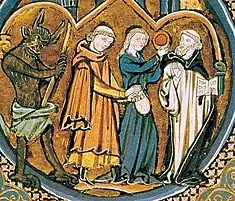Witching hour
In folklore, the witching hour or devil's hour is a time of night that is associated with supernatural events, whereby witches, demons and ghosts are thought to appear and be at their most powerful. Definitions vary, and include the hour immediately after midnight, and the time between 3:00 am and 4:00 am. The term now has a widespread colloquial and idiomatic usage that is associated with human physiology and behaviour to more superstitious phenomena such as luck.

Origins
The phrase "witching hour" began at least as early as 1775, in the poem "Night, an Ode." by Rev. Matthew West,[1] though its origins may go further back to 1535 when the Catholic Church prohibited activities during the 3:00 am and 4:00 am timeframe due to emerging fears about witchcraft in Europe.[2]
In the Western Christian tradition, the hour between 3:00 am and 4:00 am was considered a period of peak supernatural activity—this time is also referred to as the "Devil's hour" due to it being a mocking inversion of the time in which Jesus supposedly died, which was at 3:00 pm.[3]
Time
There are multiple times that can be considered the witching hour. Some claim the time is between 12:00 am and 1:00 am, while others claim there is increased supernatural activity between sunset and sunrise. The New Zealand Oxford Dictionary identifies midnight as the time when witches are supposedly active.[4]
During the time in which this term originated, many people had sleeping schedules that meant they were awake during the middle of the night.[3] Nonetheless, there is psychological literature suggesting that apparitional experiences and sensed presences are most common between the hours of 2:00 am and 4:00 am, corresponding with a 3:00 am peak in the amount of melatonin in the body.[5]
Physiology
.jpg.webp)
The witching hour may stem to a human's sleep cycle and circadian rhythm – the body is going through REM sleep at that time, where the heart rate is slower, body temperature reduced, breathing pattern and blood pressure irregular.[6] Sudden awakening from REM sleep could cause agitation, fear and disorientation in an individual.[2]
Also, during REM sleep, which usually occurs within the witching hour, unpleasant and frightful sleep disturbances such as parasomnias can be experienced, which include nightmares, rapid eye movement sleep behavior disorder, night terrors, sleepwalking, homicidal sleepwalking and sleep paralysis.[7]
Moreover, during the night and well into the witching hour, symptoms of illnesses and conditions such as lung disease, asthma, flu and common cold seem to exacerbate because there is less cortisol in the blood late at night and especially during sleep.[8] As such, the immune system becomes very active and white blood cells fight infections in the body during sleep, and this would thereby worsen the symptoms of fever, nasal congestion, cough, chills and sweating.[9][10]
Colloquial usage
The term may be used colloquially to refer to any period of bad luck, or in which something bad is seen as having a greater likelihood of occurring.[11][12]
In investing, it is the last hour of stock trading between 3:00 pm (when the U.S. bond market closes) and 4:00 pm EST (when the U.S. stock market closes), a period of above-average volatility.[13]
The term can also refer to a phenomenon where infants or young children cry for an extended period of time during the hour (or two) before their bedtime, becoming irritable and unwieldy with no known cause.[14]
To reduce gun violence, curfew hours in Washington D.C. have been in force between 11:00 pm and 12:00 am to lower juvenile gunfire incidents. Influenced by the idea of "witching hour", this occurs between 11:00 pm and 11:59 pm on weekdays and is referred to as the "switching hour".[15] Furthermore, violent crimes like rape and sexual assault would peak at midnight on average and DUI police incidents would usually tend to occur at around 2:00 am.[16][17]
See also
References
- West, Matthew. "Poems, &c. on several occasions. By Matthew West, A.M. Curate Assistant of St. Mary's, Donnybrook, and Chaplain to the Right Rev. Lord Bishop of Cork". Spencerians. Retrieved 4 December 2020.
- Should You be Afraid of the Witching Hour? by Shelly Weaver-Cather from Tuft & Needle, July 18, 2018
- Sedgwick, Icy (3 March 2019). "What time is the witching hour and does it even exist". Icy Sedgwick. Retrieved 14 November 2020.
- Kennedy, Graeme D.; Deverson, Tony (2005). The New Zealand Oxford Dictionary. New Zealand Dictionary Centre. p. 1298. ISBN 0195584511.
- Luke, David P.; Zychowicz, Karolina (2014). "Working the graveyard shift at the witching hour: Further exploration of dreams, psi and circadian rhythms" (PDF). International Journal of Dream Research. 7 (2): 105–112. doi:10.11588/ijodr.2014.2.12000. Retrieved 2017-10-06.
- Is there really a witching hour, like 3 a.m.? By Jaime Licauco from the Philippine Daily Inquirer. June 02, 2020
- Brains that go bump in the night: Stanford biologist talks about parasomnias by Erica Seigneur from Stanford Medicine. October 30, 2015
- Why do we feel sicker at night? by Louise Ní Chríodáin by the Irish Times. February 18, 2020.
- Here’s Why You Always Feel Sicker at Night by Markham Heid from Time.com. February 6, 2019
- Your Body’s Witching Hours by Melinda Beck from the Wall Street Journal. June 2, 2015.
- Manning-Schaffel, Vivian. "Cry, Cry, Cry: The latest (not entirely reassuring) research on colic". Babble.com.
- Little, Ken. "Beware of Stock's Witching Hour". About.com. Archived from the original on 2016-03-04. Retrieved 2017-10-13.
- "Witching Hour Definition". Investopedia. Retrieved 2011-10-01.
- Age-by-age guide to surviving witching hour By Jenn Cox from Today's Parent. October 26, 2020
- Keep the Kids Inside? Juvenile Curfews and Urban Gun Violence by Jillian B. Carr and Jennifer L. Doleac from CATO Institute. March 16, 2016
- Violent Crimes Most Likely to Occur At Night by Security Magazine. June 14, 2019
- Crimes that Happen While You Sleep by The Sleep Judge Editorial Team. November 4, 2020
.jpg.webp)
